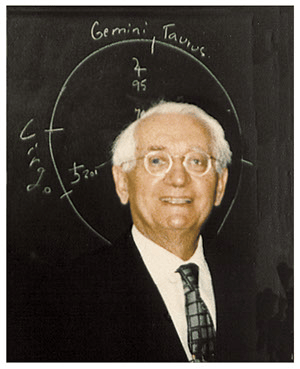Bio of Willi Sucher

Willi Sucher, born on August 21, 1902, in Karlsruhe, Germany, was a pioneering figure in the field of Astrosophy, a spiritual scientific study of the stars. His work was deeply rooted in Anthroposophy, the spiritual science founded by Rudolf Steiner. Sucher’s journey into Astrosophy began at the age of 17 when he was introduced to Steiner’s ideas by his uncle, Karl. This encounter set the course for his lifelong pursuit of integrating spiritual science with astrology.
Early Influences and Career Beginnings
Sucher’s early exposure to Rudolf Steiner’s teachings and his uncle’s discussions about astrology’s relevance in modern times profoundly influenced his path. In 1922, motivated by Steiner’s ideas on social threefolding, Sucher moved to Stuttgart, joining Bankhaus Der Komende Tag, a bank that aimed to implement these social principles. A personal encounter with Steiner at this bank left a lasting impression on him.
Transition to Anthroposophical Work
The closure of the bank led Sucher to a new position in Bruchsal, where he met his future wife, Helen. Both active in the Anthroposophical community, they married in 1927, officiated by Dr. Friedrich Rittelmeyer, the founder of the Christian Community. Sucher’s pivotal moment in Astrosophy came upon encountering a lecture by Dr. Elisabeth Vreede, head of the Mathematical–Astronomical Section at the Goetheanum in Dornach. This inspired him to explore the relationship between celestial configurations and human destiny.
Collaboration with Elisabeth Vreede
Sucher’s work with Dr. Vreede, which began in 1928, marked the beginning of a decade-long collaboration. He focused on developing the concept of death asterograms, a significant contribution to Astrosophy. His research provided fresh insights into how celestial events at the time of death reflected an individual’s life journey.
Move to England and Further Developments
As conditions in Germany worsened, Sucher was invited to England in 1937, where he met Fried Geuter, co-founder of Sunfield Home, an Anthroposophical home for handicapped children. This encounter led to his immigration to England in 1938, where he worked at Sunfield Home, developing his ideas on celestial influences and therapeutic practices.
Internment and Productive Research
During World War II, Sucher was interned as an “enemy alien” but continued his research, which he described as a fruitful period. Released in 1942, he joined Dr. Karl Konig’s home for children in Aberdeen, Scotland, furthering his studies and therapeutic work.
Later Years and Legacy
In 1944, Sucher returned to Sunfield and, along with Helen and Hazel Straker, continued his research. He later moved to London and then to Albrighton Hall, where he wrote his significant works, “Isis Sophia” and “Man and the Stars.” In 1953, the group settled in Kent, where Sucher expanded his Astrosophy research.
Sucher’s first visit to America in 1955 led to numerous lectures and workshops. He later immigrated to the U.S. in 1961, founding the Landvidi Center for Exceptional Children in Los Angeles. His later years were spent in Meadow Vista, California, where he continued his writing and research, contributing significantly to Astrosophy through his numerous publications.
Willi Sucher passed away on May 21, 1985, leaving behind a rich legacy in Astrosophy. His work continues to influence the study of celestial influences on human destiny, and the Astrosophy Research Center, established to preserve his work, remains a testament to his contributions to spiritual science.